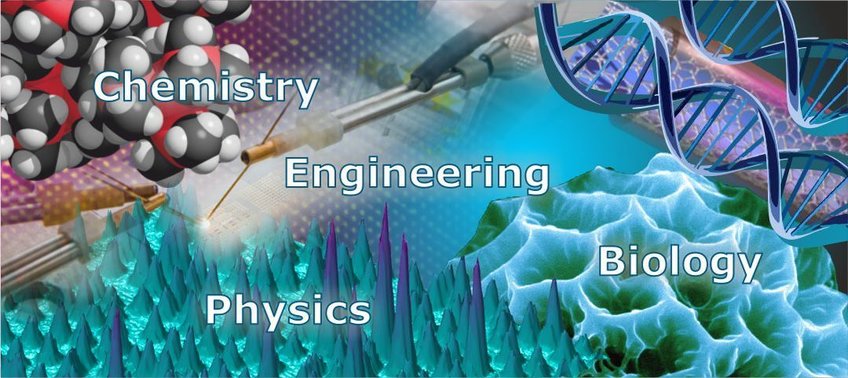
Focus
Nanoscale Science & Technology (NST) is a vital research discipline wherein novel techniques to probe and manipulate matter on the single atom and molecule scale are developed. On the fundamental side, these tools have enabled numerous new discoveries of how the properties of matter are governed by the atomic and molecular arrangements at nanoscale dimensions. On the application side, these discoveries have stimulated substantial improvements of current technologies, as well as pioneering technological innovations in a range of different fields from computing to life sciences.
The key aspect of molecular nanoscience is the design and assembly of well-defined molecular architectures, which opens extraordinary possibilities for fundamental research and applications. Essential for the organization of molecules is the interplay between intermolecular and interfacial interactions. The incorporation of functional units into the molecular modules enables to provide a pre-programmed function to the overall architecture, thus paving the way for a wide range of applications in different fields. Two-dimensional (2D) interfaces provide a particularly suitable platform for supramolecular engineering, as has been documented by the successful realization of novel 2D nanoscale functional materials or devices with custom-made properties such as charge injection, transport, or storage. This has led to the improvement of organic electronic devices, most notably field-effect transistors, light-emitting devices, photovoltaic cells, and chemical sensors. Molecular nanoscience has been strongly inspired by biological systems in nature, and there are many ongoing efforts to transfer their operation principles to their synthetic counterparts.
The exciting possibilities and benefits that can be reaped by bringing NST and life sciences under one umbrella are bilateral: NST provides the tools and technology platforms for the investigation and engineering of biological systems and life sciences offer inspiration models and bio-assembled components to nanotechnology. Correspondingly, nanobiotechnology applies nanoscale phenomena and techniques to evaluate and transform biosystems, while it uses biological principles and materials to create new devices and systems integrated from the nanoscale. The scientific challenges in such a venture are manifold. For example, with significant progress in understanding the genetic basis and biochemical pathways that are involved in disease, there is an urgent need for ultra-sensitive, highly specific detection technologies with the capability for real-time monitoring. Moreover, multi-functional analytical systems are required that not only diagnose early stages or progression of a diseased state, but also allow the identification of ultralow amounts of unique biological molecules not addressable by current assays. NST has the capacity to address such a challenge through the simultaneous engineering of nanoscale structures, processes and systems in tandem with the advancement of the understanding of biology at the nanoscale.
Establishing NST-based methodologies in life science-related fields thus holds great promise to revolutionize research in supramolecular chemistry, biology, biotechnology, and medicine. This is expected to result in a new era in healthcare, with novel strategies for the treatment and management of a range of diseases. Likewise, bringing nanoanalytical approaches together with molecular nanostructures and biomolecular interfaces is expected to deliver new strategies for next-generation diagnostic tools. Furthermore, the development of tailored catalytic surfaces and nanostructures carries immense potential to meet the urgent demands on green chemistry. These prospects from both the fundamental and application perspectives determine the research program of the
The aim of the interdisciplinary research at the interface between physics, chemistry, biology and engineering is to gain control of materials at the atomic and molecular level, enabling the design of systems and devices with functionalities approaching that of living matter. Of particular interest are:
- Bottom-up Fabrication and Assembly of Nanosystems.
- Molecular Interactions at Single Molecule Level
- Molecule Surface Interactions
- Biomolecular Interactions and Nanostructures
- Cellular Interfaces and Interactions
- Nanoscience for Sustainable Energy
- Atomic Scale Microscopy and Spectroscopy
- Ab-Initio Molecular Modeling